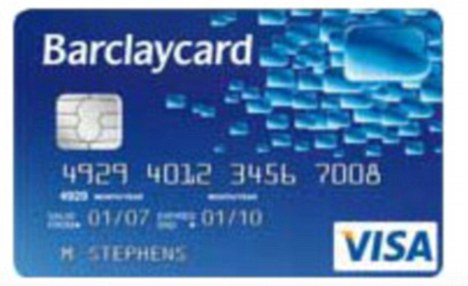Barclaycard's three-year low rate credit card deal to clear debt
Barlcaycard has launched a credit card allowing borrowers to pay off debts at a low 4.9 per cent rate for three years.
Its record long-term low interest balance transfer card is targeted at those who want to consolidate other more expensive debts in one place.
Unusually, there is no fee to transfer existing debts, and it also offers 0 per cent on purchases for six months. However, credit card specialists warn the offer benefits only borrowers with excellent credit records.

New Year, new you: The new low rate credit card from Barclaycard is 4.9 per cent for three years.
Michael Ossei, personal finance specialist at comparison site uSwitch, says: ‘It will be available only to those with a squeaky clean credit rating and a minimum income of £20,000.
‘Having stretched the balance transfer period to three years, I wonder just how many of those who apply will be accepted.’
Long-term, low-rate cards can be a canny way for borrowers to bring together other more expensive debts into one place.
This can make them easier to manage, as the repayments leave just one account each month.
However, depending on the type of debts being merged, borrowers can pick up unwanted penalty fees.
For example, to transfer an expensive personal loan to a cheap credit card often involves an early settlement fee, which can eat into the savings. And borrowers need to ensure they can meet the minimum repayment.
In many cases, if you miss a month’s payment, the cheap rate can be withdrawn.
Rivals to the new Barclaycard include MBNA’s Rate For Life card, charging 5.9 p er cent on transferred debt for as long as you have the card.
However, it charges a 1.5 per cent transfer fee and 16.9 per cent on purchases.
Most watched Money videos
- Famous 1986 Land Rover Defender advert that saw a car climb a dam
- Boreham Motorworks unveils the limited-edition Mk1 Ford Escort
- Share picks for 2025: From Nvidia to a FTSE stalwart
- 1987 Volkswagen advert champions the reliability of their cars
- Relive the iconic Renault Megane advert from 2005
- Mercedes-Benz launch wacky advert of a dancing chicken
- Ford presents new Puma Gen E: Best seller goes electric
- Jaguar targets new customers by ditching logo and going electric
- Jaguar's EV concept revealed: Type 00 comes in two colours
- Toyota relaunches Urban Cruiser as an electric tech-rich crossover
- Fed cuts key rates again amid fears it will raise inflation
- Woman becomes youngest Omaze winner after winning £3million mansion
-
 Cash Isa rush predicted as £54bn of fixed-rate tax-free...
Cash Isa rush predicted as £54bn of fixed-rate tax-free...
-
 Another council looks to introduce emissions-based...
Another council looks to introduce emissions-based...
-
 Bank of Dave scores another number one Netflix movie with...
Bank of Dave scores another number one Netflix movie with...
-
 Entain shares rise as UK punters fail to beat the bookies
Entain shares rise as UK punters fail to beat the bookies
-
 Mark Irwin set to retire as Serco boss after 12 years at...
Mark Irwin set to retire as Serco boss after 12 years at...
-
 SMALL CAP IDEA: Alliance Pharma defects amid shrinking AIM
SMALL CAP IDEA: Alliance Pharma defects amid shrinking AIM
-
 Pound tumbles and gilt yields rise as Reeves faces fresh...
Pound tumbles and gilt yields rise as Reeves faces fresh...
-
 Plus500 revenues soar as customer numbers handed Trump boost
Plus500 revenues soar as customer numbers handed Trump boost
-
 PageGroup profits hit by global hiring slowdown
PageGroup profits hit by global hiring slowdown
-
 Starmer's faulty AI project: Windfarms won't be enough to...
Starmer's faulty AI project: Windfarms won't be enough to...
-
 Can Donald Trump and Elon Musk send UK space firms into...
Can Donald Trump and Elon Musk send UK space firms into...
-
 MARKET REPORT: Ladbrokes owner Entain shrugs off American...
MARKET REPORT: Ladbrokes owner Entain shrugs off American...
-
 Sosandar cashes in on strong demand over Christmas as it...
Sosandar cashes in on strong demand over Christmas as it...
-
 Trusts step up attacks on Saba claiming fees could...
Trusts step up attacks on Saba claiming fees could...
-
 Heathrow planning expansion after record-breaking...
Heathrow planning expansion after record-breaking...
-
 Labour ministers are urged to urgently crackdown on LED...
Labour ministers are urged to urgently crackdown on LED...
-
 RUTH SUNDERLAND: Tariffs won't come up Trumps for Donald
RUTH SUNDERLAND: Tariffs won't come up Trumps for Donald
-
 Hedge fund boss claims he will be a 'white knight' for...
Hedge fund boss claims he will be a 'white knight' for...



























